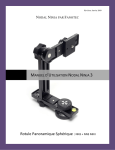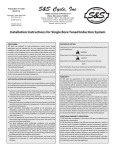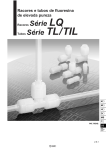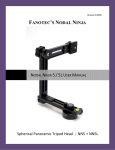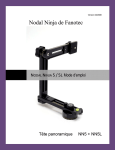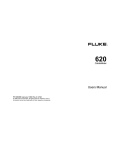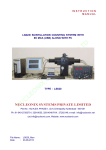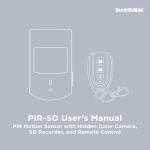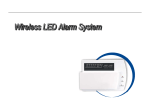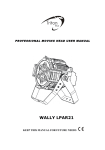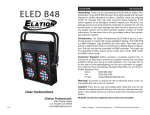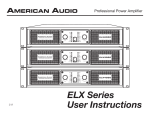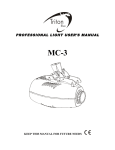Download Manual - Nodal Ninja
Transcript
Fanotec® Spherical Panoramic Tripod Head NN5 & NN5L Manual Images and content are subject to change without notice. Please visit www.nodalninja.com for the latest prices and information regarding the NN5 & NN5L. -1© 2005-2013 Nodal Ninja® Contents Introduction..............................................................................................3 Nodal Ninja 5 Features............................................................................4 Nodal Ninja 5 Exploded View..................................................................7 Parts List.........................................................................................8 Upper Assembly............................................................................................... 8 Lower Assembly............................................................................................... 8 Part Specifications..........................................................................9 Lower Rail Assembly........................................................................................ 9 Upper Rail Assembly......................................................................................10 Hard Shelled Cases for Nodal Ninja 5...................................................11 Basic Assembly.....................................................................................12 Removing and Replacing Detents ........................................................13 Setting up with Known NNP..................................................................14 Setting the lower rail.....................................................................14 Setting the upper rail ....................................................................15 Using the Camera Mounting Plate (NCP1)............................................16 Mounting in Landscape Mode...............................................................17 Quick Release Adapters........................................................................18 Fanotec’s Arca Style Swiss Quick Release Clamp.......................18 Cameras / Grips with Off-axis Tripod Mounts........................................19 About Parallax.......................................................................................20 Finding the Entrance Pupil of a Lens.....................................................21 Warranty................................................................................................25 Returns..................................................................................................26 Copyright Information............................................................................27 Contributors...........................................................................................28 -2© 2005-2013 Nodal Ninja® Introduction Congratulations on your recent purchase and welcome to the exciting and growing world of panoramic photography. Panoramic photography is one of the fastest growing segments in photography. With developments in hardware and software, this technology allows for the creation of seamless stitching of multiple images. From simple two shot panoramic images or complex 100+ shot super mega pixel mosaics, the Nodal Ninja is hardware designed to work in conjunction with your camera and lens to eliminate parallax when shooting adjacent images. Our panoramic tripod head is a quality piece of equipment designed to give you many years of use. Nodal Ninja 5 is specially designed Spherical Panoramic Tripod Mount allowing the photographer to adjust a camera/lens exactly over its correct rotational axis called the entrance pupil (aka Nodal Point). This helps to eliminate parallax error inherent when shooting multiple images side by side. Without parallax, a photographer can seamlessly stitch multiple photographs together, forming a larger, higher resolution composite image. This manual will cover the important aspects of both Nodal Ninja 5 (NN5), as well as a slightly modified version of NN5 called Nodal Ninja 5 Lite, hereafter referred to as NN5L. It is important to note that some features may vary slightly from the actual unit you have. Because NN5L is basically a NN5 without the upper arm click stops (more on that later), this manual will primarily focus attention to the NN5 unless noted otherwise. -3© 2005-2013 Nodal Ninja® Nodal Ninja 5 Features We have compiled a list of the features and benefits of Nodal Ninja. When shopping panoramic tripod heads you need as much information as you get. We feel Nodal Ninja offers the best performance with features against price. Here is a summary of the strong points of Nodal Ninja 5. −− Price – much lesser expensive to comparable heads. −− Longer arms – (about 40mm longer than NN3). This helps to accommodate larger cameras like the D2X, D3 or MK II, MK III, and cameras with battery packs and even many medium and large format cameras. −− Accepts a much broader range of lenses, from an 8mm Sigma to Nikon’s 70-200mm f2.8. −− −− NN5 - Upper arm 15 degree detents with positive locks. (NN5L does not have upper arm positive stops). −− Upper arm rotator with 2.5 degree marking, good for making high resolution mosaics. −− NN5 will accept loads up to approx 10 kgs due to upper arm positive locks. −− NN5L will accept loads up to approx. 7kgs. −− Allows your camera to be mounted in landscape mode. -4© 2005-2013 Nodal Ninja® −− Fits all tripod heads – uses both 3/8” & 1/4” thread mount adapter. −− Small Rotator Base - less foot print to edit out when doing full spherical panos. −− Closed rail design – assures your expensive camera won’t slip off accidentally. −− Detachable upper arm detents to rotate about any desired increment. −− Large, easy to turn, knurled edge adjustments knobs (great with gloves in cold weather). −− Allows the use of many Quick Release Adapters. −− As small as 10 degree click stops in lower arm rotator are possible. −− Reversible detent rings. −− Detent rings can be disabled on the fly without any tool. −− More precise rotator base with locking function. −− Made to higher precision tolerances than earlier models. -5© 2005-2013 Nodal Ninja® −− Demarcations in increments of 2.5 degree on both upper and lower rotators, great for doing high resolution mosaics at longer focal lengths. −− Rail stops for “remembering” camera and lens settings. −− Leveling – built-in quality bubble level for exact leveling. −− Lower and upper arm rulers for precise measuring of Entrance pupil settings. −− Compact – breaks down to only 90mm x 210mm (8”x3 ½”). −− Weight – only 857 grams. −− Attractive, foam lined, zippered hard shell carry case. −− Customer support. −− Two year manufacture warranty. -6© 2005-2013 Nodal Ninja® Nodal Ninja 5 Exploded View -7© 2005-2013 Nodal Ninja® Parts List Upper Assembly −− 1 – Upper Rotator Tightening Knob −− 2 – Metal Washer −− 3 – Upper Arm Rotator Detent Pins 4ea −− 3a – Upper Arm Rotator Hex Screws 4ea −− 4 – Vertical Rail −− 5 – Upper Horizontal Arm −− 6 – Rail Stop Screw −− 7 – Camera Mounting Knob −− 8 – Metal Washer −− 9 – Camera Mounting Plate −− 10 – Rail Stop Plate −− 11 – Upper Arm Support Screw Lower Assembly −− 12 – Lower Horizontal Rail −− 13 – Rail Stop Plate −− 14 – Lower Detent Release Knob with Rubber O-Ring −− 15 – Lower Rotator Tension Knob −− 16 – Vertical Rail Mounting Knob −− 17 – Metal Washer −− 18 – Lower Rotator Lock Knob −− 19 – Rail Stop Screw −− 20 – Lower Rotator Outer Housing −− 21 – Lower Rotator Hex Screws 2ea −− 22 – Lower Rotator Detent Pin −− 23 – Reversible Detent Ring -8© 2005-2013 Nodal Ninja® Rings available: 10/12 degrees, number of stops around n = 30/36 15/18 degrees, number of stops around n = 24/20 20/24 degrees, number of stops around n = 18/15 30/36 degrees, number of stops around n = 12/10 45/60 degrees, number of stops around n = 8/6 90/120 degrees, number of stops around n = 4/3 45&60/90&120 degrees, number of stops around n = 8+6/4+3 −− 24 – Lower Rotator Inner Housing −− 25 – 3/8” to 1/4” Screw Adapter Part Specifications Lower Rail Assembly Adjustment distances from the lower rotator center point to the upper vertical arm mounting point, minimum adjustment distance 53mm (2 1/4”), maximum distance 146mm (5 3/4”). The lower horizontal rail is used to slide the upper vertical assembly (when attached) into 1 of 2 needed entrance pupil positions, depending on the camera and lens being used. The rail has a laser engraved scale marked in millimeters (1 mm intervals). The grooves of the scale are filled with water resistant paint to increase clarity. The lower rail assembly incorporates the “lower rotator assembly”. The lower rotator assembly allows for 360 degree horizontal rotation. The rotator base is engraved with demarcations in 2.5 degree intervals, with longer tic marks at 5 and 10 degree intervals. Numerical values every 20 degrees with diamond tic marks every 10 degrees make for great visual reference when rotating or panning the camera/lens across the horizontal plane. Mounting a camera/ lens in horizontal mode allows for very precise rotation to shoot across the horizon line. Using in conjunction with the upper rotator allows for very precise rotation for single row and multirow spherical panoramas. -9© 2005-2013 Nodal Ninja® Upper Rail Assembly Overall dimensions of upper rail = 190mm x 35mm x 10mm (7 1/4” x 1 5/8” x 3/8”). Adjustment distances from the upper rotator center point to the upper rail camera mounting point, minimum adjustment distance 33mm (1 1/2”), maximum distance 148mm (5 7/8”). This would be the maximum distance from camera mount to entrance pupil (a.k.a. nodal point) of a particular lens. The upper horizontal rail is used to slide the camera/lens into 1 of 2 needed entrance pupil positions, depending on the camera and lens being used. The rail has a laser engraved scale marked in millimeters (1 mm intervals). The grooves of the scale are filled with water resistant paint to increase clarity. The upper rail assembly incorporates the “upper rotator assembly”. The upper rotator assembly allows for 360 degree vertical rotation. The rotator is engraved with demarcations in 2.5 degree intervals, with longer tic marks at 5 and 10 degree intervals, numerical values of 0, 30, 60, and 90 degrees with diamond marks every 10 degrees. These markings add for great visual reference when tilting the camera to do multirow panoramas and full spherical panoramas. NN5 Note: The upper rotator assembly can be locked “positively” every 15 degrees. The weight load limit of camera/lens with this locking detent system is approximately 10kgs (20 lbs). The upper rotator detents can be easily detached by unscrewing the 4 hex screws (see 3a above). This will free the rotator for detent free rotation. This is ideal when using longer focal length lens and for those doing mosaic photography. When opting to detach the upper detents the weight load limits decreases to approximately 7kgs (15lbs). The upper rotator detent system is NOT available with NN5L. - 10 © 2005-2013 Nodal Ninja® Hard Shelled Cases for Nodal Ninja 5 We have available very attractive hard shelled cases (item# N5HC). These cases are padded with a foam Dual zippered for added opening lining. convenience. - 11 © 2005-2013 Nodal Ninja® Basic Assembly NN5 comes preassembled in two parts – upper and lower assembly. Place vertical arm assembly on lower rail assembly and secure with the Vertical Rail Mounting Knob. Place vertical arm assembly (2) on lower rail assembly and secure with the vertical rail friction set knob (1). Make sure the vertical assembly is positioned so the upper rail is facing so it’s on the inside. You will see the vertical rail also has two feet at the base – the longer is to point inwards, towards lower rotator. - 12 © 2005-2013 Nodal Ninja® Removing and Replacing Detents Disassemble the lower rotator assembly by completely unscrewing the friction set knob on top (with markings). Using the enclosed hex key loosen the inner hex screw enough to release detent ring. Some units may have the hex key tool located inside the tension knob, as shown above left. Place the detent ring with desired side face up. Tighten hex screw and reassemble. At the time of this writing we have the following rings available: −− 10/12 degrees, number of stops around n = 30/36 −− 15/18 degrees, number of stops around n = 24/20 −− 20/24 degrees, number of stops around n = 18/15 −− 30/36 degrees, number of stops around n = 12/10 −− 45/60 degrees, number of stops around n = 8/6 −− 90/120 degrees, number of stops around n = 4/3 −− 45&60/90&120 degrees, number of stops around n = 8+6/4+3 - 13 © 2005-2013 Nodal Ninja® Setting up with Known NNP If you already know the “No Parallax Point” (NNP) of your camera and lens there are only two adjustments to deal with on Nodal Ninja to properly position it. The exception would be if your camera, or battery grip, has an offset tripod mount in which case you will need to compensate with a T-adapter as explained later. In the samples to follow we’ll use the NN3 in some images as the same basic principles apply. Setting the lower rail With the camera/lens mounted, rotate the upper rail so it is perpendicular to the ground. Point the camera directly down, making sure the barrel of the lens is in line with the upper rail. Loosen the lower vertical rail knob (shown in image as adjustment knob), slide the vertical and upper assembly back and forth on the lower rail unit until the camera/lens is positioned directly over the lower rotator knob (with marking). You can look through the camera viewfinder to help center. Once centered, you have your first of two settings. Insert a rail stop as shown and tighten to lock, and remember this position. The lower position is now set and will not change regardless of lens or focal length . - 14 © 2005-2013 Nodal Ninja® Setting the upper rail Loosen the upper rotator knob and rotate the upper rail with camera/lens still attached so it points straight out (parallel with the ground), as shown to the right. This position is known as 0 degrees. Next loosen the camera mounting knob and slide the camera on the upper rail until the NNP of the lens is centered with the upper rotator. In the example we show the Nikon D70 with 10.5mm lens. The NPP point on this lens is very near the gold ring. So we slide the camera/lens on the rail so the ring is centered with the upper rotator, which is also in line with the center of the vertical rail. Insert a rail stop as shown and tighten to lock, and remember this position. The upper position is now set, unless you change camera and / or lenses or vary the focal length, it will remain as is. Using the rail stops after you learn your settings will allow you to remember the same position when re-mounting your camera. You can place the rail stop on either side of the camera plate. The image shows the rail behind the plate. - 15 © 2005-2013 Nodal Ninja® Using the Camera Mounting Plate (NCP1) When mounting the camera plate (CP), make sure it is perpendicular to the camera body to assure a snug fit. Do NOT twist the CP to tighten, secure using the 1/4 screw with coin or screwdriver. Twisting the CP to tighten may damage the rubber skid plate on your camera base. This would also apply to using the T-adapter as well. When using the CP mounting plate it is possible to rotate it 180 degrees on the base of the camera giving a bit more forward or backward movement, depending on which way it is mounted. This is a personal preference as some cameras allow for a better grip in one position while others will allow for a better grip (more surface mounting area) in the opposite position. This setup allows you mount your camera and lens in portrait mode (sideways) onto the upper rail on Nodal Ninja. - 16 © 2005-2013 Nodal Ninja® Mounting in Landscape Mode Mounting your camera and lens in landscape mode allows for horizontal panning only. NN5 will support lenses like the Nikon 70-200mm VR f/2.8. When using lens of this length it is advised you mount using the lens tripod mount. - 17 © 2005-2013 Nodal Ninja® Quick Release Adapters Fanotec’s Arca Style Swiss Quick Release Clamp The new low profile Arca Style Plate by Fanotec mounts to the base of your camera. This plate can be used with Fanotec’s Arca Style Clamp (ASQRC-2) and / or most Arca Style Clamps for mounting in a reproducible manner. Incorporated into the plate is a 10mm offset for battery grips (as with some Canon Grips) where the tripod mount is not centered with the barrel of the lens. Not recommended for use with NN3 if used with Camera Plate and Arca Style Clamp. - 18 © 2005-2013 Nodal Ninja® Cameras / Grips with Off-axis Tripod Mounts If your camera has a tripod mount that is offset from the center of the barrel of the lens, you will need the N3T30 or N3T30 offset T-adapter. First, determine if the T-adapter will be needed. Look at the base of your camera and note the position of the 1/4” female tripod mount. If this tripod mount is off center from the center portion of the lens, you’ll need to use the small camera bracket. If it is 20mm or less, you can use the N3T20. If the offset is greater than 20mm and less than 30mm, you can use the expanded N3T30 T-adapter. Using the T-adapter allows your camera to be positioned on the Nodal Ninja in such a way as to achieve proper rotation about a camera lens NPP. (NN3 used in sample images). - 19 © 2005-2013 Nodal Ninja® About Parallax Parallax defined Parallax is the apparent shifting of a foreground object relative to a background object when viewed at different angles or perspectives. With panoramic photography, multi-shot images or images shot side by side create an issues know as parallax. This is because each image shot is actually different from the one before it due to the minor shifting of objects in the field of view. The foreground objects will tend to shift from the background objects if the camera is rotated outside the no parallax point (NPP) of the lens. Seamless stitching of adjacently shot photos is almost impossible with tell tale lines whenever parallax is prevalent. Things simply won’t line up properly. Parallax Demonstrated Hold your thumb out in front of you at arm’s length and view it with your right eye (left eye closed). Move your head side to side while remaining focused on the background, and you’ll see your thumb move side to side relative to the background – this apparent change in position is due to the effects of parallax. This is the same thing that happens when a camera is rotated on a tripod. Tripods are NOT designed to eliminate parallax with panoramic photography. Using a special head like the Nodal Ninja, and adjusting it properly, so it rotates about the “entrance pupil” of a lens, will eliminate virtually any parallax. Parallax and Panoramic Photography Once parallax free images are taken, and with the use of special “stitching software”, you are able to seamlessly stitch the images together. - 20 © 2005-2013 Nodal Ninja® Finding the Entrance Pupil of a Lens What is the Nodal Point or Entrance Pupil and why is it important? We would like to take a moment and dispel misconceptions of the word “Nodal Point”. When referring to this no parallax point (NPP), many still refer to it as the Nodal Point. Technically, the point at which you would rotate the camera/lens to avoid parallax is called the “entrance pupil”. The entrance pupil is a floating point located inside the lens, at the point where the light refracts or reverses itself before continuing to the image sensor or film plane. The entrance pupil is different on each lens and changes at different focal lengths. The entrance pupil (incorrectly referred to by some as nodal point) of a lens is the virtual image of the aperture formed by the lens elements in front of it, and is the place where light paths cross before being focused onto the CMOS, CCD or film plane. For a light ray to pass through the lens, it must be directed towards the entrance pupil, which is therefore the center of perspective. Note that the entrance pupil can be outside of the lens and even behind the film plane! When taking adjacent images you want to rotate the camera around a line that runs through (or very close to) the entrance pupil. By finding the entrance pupil of the lens, and rotating the camera about this point, you will assure parallax free images. Parallax is more obvious in the viewfinder with objects close to the camera. The more distant the objects, the lesser the parallax. If using a lens with zoom capability, the entrance pupil will change in position as the zoom changes. Because of so many variables, it is best to learn how to find the entrance pupil manually. - 21 © 2005-2013 Nodal Ninja® To locate the NNP of a lens, have the camera/lens setup on Nodal Ninja as shown to the right. You want the camera as far back on the upper rail as possible, pointing towards the horizon and parallel with the ground. Position in front of the camera two objects – one nearer than the other. For example, indoors you could use two lamp poles, one at about 6 feet the others at about 10 feet, or if outside try using two fence posts or light poles. Any two objects creating a vertical line will work as long as one is positioned behind the other. In this example we’ll use two floor lamps. Looking inside the viewfinder, or at the LCD screen, rotate the camera so the two objects are towards the left side of the frame. Note the exact position of the two lamps. Ideally place the lamps so they aren’t directly behind each – slightly offset them. Note the apparent distance between the two lamp poles, as shown below. - 22 © 2005-2013 Nodal Ninja® Now rotate the camera so the two objects are now in the right side of the viewfinder frame. Go back and forth a few times, and watch to see if the distance between the two poles changes. If the distance changes, even slightly, then you have parallax and you’ll need to move the camera and lens slightly forward (or back) on the upper rail. Loosen the camera mount knob and move the camera forward approx ½ inch (10 mm) and tighten. Repeat until the lamps remain relatively unchanged, as shown below. You do not want to any change in movement between the two objects. Simple recap – outside you could use two trees or two power poles (target) – one forward the other distance and slightly offset from each other, giving you a space between them. When looking through the viewfinder of your camera, move target from left to right side of viewfinder – if they move closer of farther apart, you need to adjust camera on upper rail either slightly back of forward until no movement is noted between the two while rotating camera left and right. Note the position on both upper and lower rails and use the rail stops to set the position. If you change cameras or lenses, you’ll need to repeat the above steps. Now you’re ready to start shooting panoramas. - 23 © 2005-2013 Nodal Ninja® Warranty Nodal Ninja is a quality instrument. Under normal usage it will last many years. We feel so confident our product will stand the stand of time, we issue a 2 year warranty from the date of your purchase – one of the best in the industry. In the unlikely event a part wears or breaks, simply contact us for a replacement part. We will replace any part that is deemed to be defective at no cost to the consumer other the cost of postage to send it in. Customer abuse or misuse (to be determined by manufacturer and / or distributor) will void any implied warranty. This warranty is issued to the original buyer only, is non-transferable. The manufacturer (Fanotec) and / or distributors also assumes no liability for damage caused to equipment, or downtime time caused as a consequence of not being able to use our product, or injury caused to persons using Nodal Ninja. Please keep out of reach of children. As with any piece of equipment, use it appropriately. We do not want to get into a lot of expensive legalize, but we would like the buyer to understand and accept at time of purchase ALL responsibilities that arise out of the use of our products either directly or indirectly. - 24 © 2005-2013 Nodal Ninja® Returns We realize Nodal Ninja might not work for everyone. If you find for any reason you are not happy with your purchase, please contact us immediately for return instructions. We will accept items returned if “received back” NO LATER than 14 days for NN5. We will refund the original amount paid less shipping and handling. Returns must include “all” materials as shipped, no scratches or obvious marks. Items received as stated above will be refunded item cost (less shipping and handling). Items missing from shipment will be deducted from the refund at full retail price at time of receipt. Items received back in condition noted above “after” 14 days of buyer receipt, but no later than 60 days, will be offered 75% refund off purchase price (less shipping and handling paid). Please allow up to “7 days” to process and issue your refund. For international orders we are not responsible for exchange rate differences from the time you buy to the time money is actually refunded. Our return policy only applies to purchases made through our website, and may differ from those of our other online store fronts and / or authorized resellers. eBay’r Note: Nodal Ninja’s sold on eBay from individuals are NOT covered by any warranty, nor we can offer any support - buy at your own risk. Also, please report any illegal use of images and text that may have been copied from our website. If you wish to return your order, please contact us for instructions. Policies do change with time, so please reference our current return policy on the website. - 25 © 2005-2013 Nodal Ninja® Copyright Information The materials contained in this manual and website as well as any translations may be downloaded or copied provided that all copies retain our copyright notice. No material may be modified, edited or taken out of context, such that its use creates false or misleading information. The name and trademarks of copyright holders may NOT be used in advertising or publicity pertaining to the website, its content, or specifications without specific, written prior permission. Title to copyright in these documents and website belong to CircularWorlds. com, Nodal Ninja and Fanotec. - 26 © 2005-2013 Nodal Ninja® Contributors The following people helped to contribute to this User Guide: −− Bill Bailey – www.CircularWorlds.com −− Nick Fan – www.Fanotec.com (coming soon) −− Rosauro Ona – www.RosauroPhotography.com −− John Houghton – http://www.johnhpanos.com © 2013 Nodal Ninja ® All Rights Reserved - 27 © 2005-2013 Nodal Ninja®




























